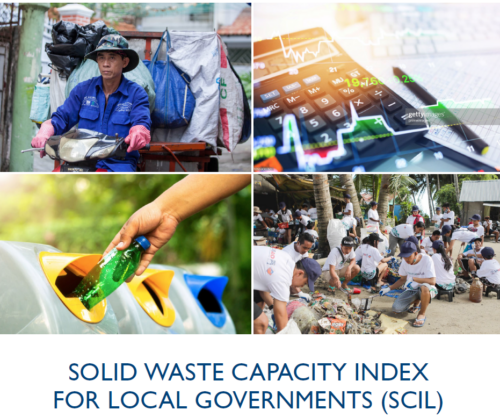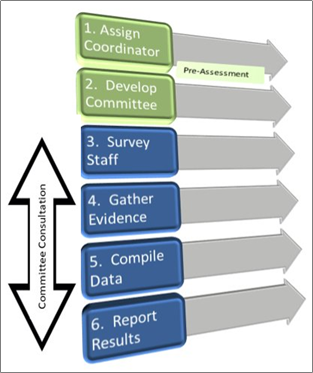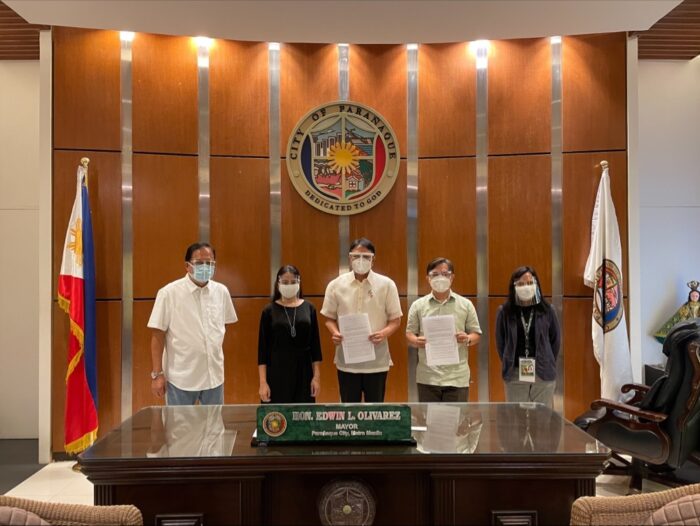USAID Develops New Self-Assessment Tool to Strengthen Local Government Capacity for Sustainable Waste Management Systems

Around the world, solid waste management is the responsibility of local governments, which are tasked with creating and implementing reduce, reuse, recycle (3R) programs and solid waste management (SWM) systems. These systems are critical to creating healthy and clean communities for their citizens and are the first line of defense toward preventing waste from leaking into the environment and contributing to ocean plastic pollution. Local solid waste management is often mandated and regulated through national policy and regulations; in many rapidly developing countries and cities, on-the-ground implementation falls short because local governments often lack the institutional capacity and resources to plan, build, operate, and sustain these systems.
To address this gap, USAID’s Clean Cities, Blue Ocean (CCBO) program developed its Solid Waste Capacity Index for Local Governments (SCIL – pronounced “skill”), based on observations, experience, and research conducted by CCBO’s global and local team of experts across its global engagement sites in Asia, Latin America, and the Caribbean. The SCIL is an assessment-based tool, which provides a comprehensive and distilled approach that enables local governments to self-assess their current SWM capabilities and pinpoint where capacity building is necessary to create and sustain more economically and environmentally sound waste management systems.
Development of the SCIL Assessment

After CCBO’s launch in late 2019, the program conducted Initial Solid Waste Management Assessments across its focal country engagement sites to analyze how SWM systems are currently being implemented and managed, including information on waste generation, services, facilities, and the status of their 3R/SWM planning. The findings were compared against the requirements of current national legal frameworks to identify gaps, develop recommendations, and inform capacity building needs—identifying a host of similar areas for improvement common across rapidly developing cities and countries. From these analyses, the concept and design of the SCIL was born—with a broad framework that enables the assessment tool to be used globally but establish locally-tailored capacity building plans that meet sites’ specific and nuanced needs.
The SCIL Assessment focuses on six core components required for robust and sustainable solid waste management: planning; policy and legal framework; financial management; service delivery; human resources; and community engagement. The SCIL is designed to be locally-led by a local government committee, with guidance and support from CCBO, so that the assessment also serves as a learning experience and begins to be institutionalized within the agency. Its six components were developed in a cascading manner, with criteria becoming more specific with each level.
Once completed, the SCIL provides a meaningful and actionable “score,” or capacity rating, that identifies where each local government can focus capacity building activities that will be most effective and impactful. The score also allows local governments to measure their initial status and monitor their capacity improvement over time by re-completing the assessment each year. Once the SCIL Assessment is completed, the committee can develop an accompanying roadmap for improvements in each key capacity area, recommending related training and identifying forward-looking policy and operational changes.
The SCIL Pilot and Rollout

After developing the SCIL, CCBO sought to pilot the tool to test its content, user experience, and results before implementing it across the program’s more than 25 global engagement sites. Beginning in Parañaque City in Metro Manila, Philippines, CCBO signed a Memorandum of Understanding with the city government. The city’s strong political buy-in and leadership sets a precedent for local and national governments moving forward to build government capacity in parallel with locally-led solutions piloted by grantees and other partners. Parañaque’s local government capacity is being complemented by CCBO grants and technical support to implement right-sized infrastructure and other system prerequisites needed for a more circular local economy.
To launch the pilot, Parañaque City identified and assembled a dedicated SCIL implementation group, composed of local government department heads, and CCBO conducted a committee orientation meeting to present the mechanics, components, and benefits of the assessment tool.
“The SCIL process has enabled us to convene representatives from all of the local government’s departments in one place to talk about solid waste management—something that is not commonly done. Through these conversations, each [local government department] has been able to more clearly see how they—and other departments—fit into the solid waste management chain, end-to-end.” – Lori Scozzafava, CCBO’s Capacity Development and Governance Director
Survey responses to the six components are submitted within a few weeks of the tool’s launch and the overall process of compiling the data and findings and developing a report takes two to three months. At the culmination of the pilot, CCBO found that the pilot not only generated necessary data but going through the process facilitated capacity building in and of itself.
“Questions from the assessment really challenged us to think about things we hadn’t considered. So, we’re already thinking about adding several new components to our SWM plan. We now realize that we can do more on waste reduction and reuse.” – Terrence Rivera, Senior Environmental Management Specialist of Parañaque City’s Environment and Natural Resources Office (CENRO)
In Parañaque, for example, the first steps of the assessment highlighted three crucial needs: institutionalize feedback mechanisms on the current service level from the local government; develop and implement systematic record keeping; and, improve budgeting processes for 3R/SWM planning.
“We don’t have a budget for all that we want to do. We know that needs to change.” – T. Rivera
Additional Tools and Resources
The SCIL Assessment is one of a number of technical support mechanisms that CCBO will offer in its focal countries. To support partners to respond to the needs identified by the SCIL, such as budget development, additional training and resources are being developed to help build capacity in areas identified by the SCIL and enable local governments to have a “toolkit” of resources to promote robust planning. For example, CCBO is developing guidance for identifying funding options, to be released in early 2022, to support local governments in identifying how to generate sufficient funds to cover the full cost of 3R/SWM systems. The concepts and guidance found in this document will be used to facilitate discussions and analysis at the local level on how to diversify and increase revenues that can be used to properly fund 3R/SWM systems.

